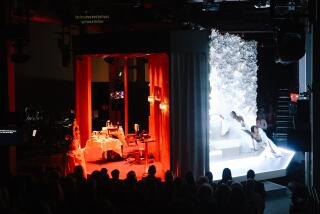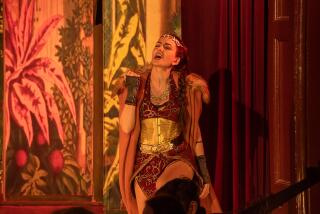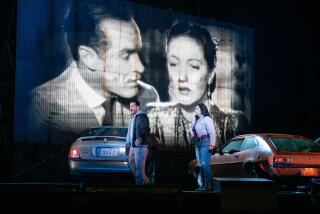Tonio Always Gets the Girl; High Cs Win Audience
- Share via
A high C is not the highest note a person can sing. It is not the highest note in the opera repertory. It is certainly not the top note in every aria.
Still, a certain mystique surrounds the high C. As challenging a goal as the four-minute mile, everyone understands the effort and cheers the accomplishment--or grimaces at the failure.
One high C is hard enough. Imagine having to sing nine, almost in a row, as do the four tenors alternating in the role of Tonio in Donizetti’s “The Daughter of the Regiment” this week for five performances at the Cerritos Center for the Performing Arts.
The Donizetti challenge is so daunting that few tenors dared to try even the aria, “Ah! Mes Amis,” since the days of the opera’s premiere in 1840.
Then, in 1972, a young singer named Luciano Pavarotti conquered New York, singing all nine (the last of which is held) as if he were minting gold coins. That’s when people began calling Pavarotti “the King of the High Cs.”
*
What’s involved in singing the note? A soprano’s vocal cords must vibrate at more than a thousand vibrations a second, according to Robert Rushmore in his influential book, “The Singing Voice” (1971, Dodd, Mead).
Rushmore points out that the great Rosa Ponselle’s voice cracked on a high C in Verdi’s “Aida,”--and she never sang the role again. Helen Traubel broke on the note in Wagner’s “Tannhauser” during a radio broadcast, and it was only that note that people talked about.
A tenor, who sings an octave lower than a soprano, has it easier. His cords must flutter at about 500 vibrations a second. Yet the psychological demand can be greater. We expect a woman’s voice to be high, so the note seems within range. But we don’t have to be singers to realize that, for a tenor, hitting the high C is an effortful, even unnatural, achievement. He’s broken the four-minute mile.
Maybe that’s why the Three Tenors keep playing to sold-out sports stadiums while the Three Sopranos have virtually dropped off the map.
Ideally, the note conveys emotion in the aria. It’s not just for display, although it can be that too. It can represent extreme agony or hope or joy, as with Tonio in “The Daughter of the Regiment.”
Tonio has joined a regiment that collectively had adopted the orphan Marie, now a grown woman whom he loves. In the aria, Tonio asks for her hand. One of the funniest lines in this sparkling comedy is when he addresses them as fathers in the plural: “Messieurs son pere.”
At first they refuse to give permission but relent when he tells them that Marie loves him.
He pours out his joy, singing “Pour mon a^me quel destin! J’ai sa flamme et j’ai sa main!” (“What a future for my heart! I have her love and her hand!”)
Bang goes the voice, up in volleys of high Cs, the last of which he holds for what seems forever. The audience goes nuts, and, perhaps, another star is born.
* The New York City Opera National Company presents Donizetti’s “The Daughter of the Regiment” Wednesday and Friday at 8 p.m., Saturday at 2 and 8 p.m. and Sunday at 2 p.m. (An 8 p.m. Sunday performance has been canceled.) At the Cerritos Center for the Performing Arts, 12700 Center Court Drive. $25-$45. (800) 300-4345.
More to Read
The biggest entertainment stories
Get our big stories about Hollywood, film, television, music, arts, culture and more right in your inbox as soon as they publish.
You may occasionally receive promotional content from the Los Angeles Times.










